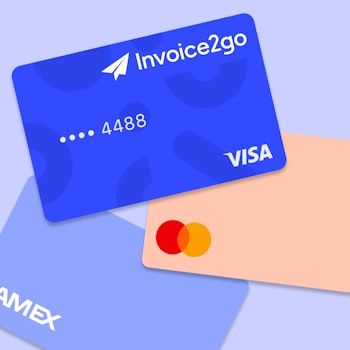Q&A with Grow winners Wendy Brehm and Trevon Williams, founders of Purple Rose Wellness
While there have been promising signs of change, the wellness industry still isn’t exactly known for its accessibility or inclusivity. Scroll through the search results for “#wellness” on Instagram or TikTok, and you’ll see posts from mostly white, thin, non-disabled creators, who fit the aspirational ideal.
But the wellness content from this mere sliver of the population doesn’t resonate with everyone. People from historically marginalized communities also deserve wellness content made for them, and by them.
Wendy Brehm and Trevon Williams – two winners of Grow, our program to award $200,000 to support minority-led small businesses – launched Purple Rose Wellness to help fill this gap. What began as a candle making hobby has since blossomed into a full-fledged business that not only sells homemade luxury self-care goods, but also provides inclusive, accessible wellness education content in both American Sign Language (ASL) and English, primarily on Instagram.
Wendy, who is Deaf, and Trevon, who is Black, know all too well the struggle to find accessible, culturally relevant wellness content. They’re excited to use their Grow grant to build a free, one-stop wellness education platform that covers everything from mental health to financial literacy. The life partners-turned-business partners plan to hire Deaf and BIPOC freelancers to develop this content in ASL, English, and Spanish, creating jobs in their communities while offering them content by experts who share their lived experiences.
Wendy and Trevon chatted with us via Zoom from their home in Maryland as their one-year-old daughter babbled in the background (although she also made a few cameo appearances – “to supervise,” Wendy joked). They told us about the evolution of their business; the frustration of not finding wellness resources created with them in mind; and their goal to empower their communities to have needed conversations about mental health and other “taboo” subjects.
Tell me a little about yourselves and what inspired Purple Rose Wellness.
Wendy: I feel like Purple Rose Wellness is really an extension of who we are, in many ways. I think I’ve always been a creative person but struggled with honing that creativity and finding where it belongs, you know? I went to college for law – a pre law program – and it was really intense. We’ve always wanted something to do that was fun.
And then one day, my hair caught on fire. There was a candle on the dining room table right outside my bedroom door, where I was doing homework. There was a draft coming into the open bedroom, but there was nothing lit or flammable in the room that could’ve caused it. Tre was in the bathroom and came running out. It could've been so much worse, and I wanted to make sure that the people we love and care about don’t have anything in their homes that causes that kind of thing.
Tre was like, “Do you want to just try and create a candle?” I love candles. I thought, yeah, why not? It honestly was something fun to do when I had free time and then eventually it became, ok I want this to be something that I see in my community. I want people like us to be able to buy candles and know the ingredients in them are safe. So that’s kind of how it all started.
I think we see our business growing, and we want to give back to our communities in more ways than selling candles that are clean. That’s a great thing in and of itself, but Black and brown communities, marginalized communities, and the Deaf community don’t have a lot of access to information on what it’s like to start a business, what you have to do. Financial literacy is also part of wellness – understanding what it means to create something for yourself, building wealth.
We are parents to a now one-year-old, who is very active. In my day to day, I work for a Deaf organization as their legal and compliance analyst. Tre left his job as a pest control technician after our daughter was born to be a stay-at-home dad and take on more of the business.
Were you both interested in wellness even before the hair incident?
Wendy: I have a tendency to take on way too much. Talking about [wellness] more and building that as our brand has really forced me to be more introspective and take better care of myself. It’s made me a better person, wife, and parent, and that’s something I want to share with others.
Trevon: I used to be about 80 pounds heavier. I started my wellness journey when my doctor said I needed to take better care of myself.
Whenever I start doing something, Wendy’s always like, “Ok, let’s do some research so we can start looking at different meals. Look at this. Look at that.” One thing led to another, and we went from candles to starting on more wellness things, more meal prepping, more exercise.
Wendy: That’s probably what generated the education side of it. I feel like there wasn't a one-stop shop where I could go for everything related to wellness. His weight journey, and me having endometriosis and then becoming pregnant unexpectedly – all of that made us really stop and think, what do we want for ourselves? How do we want to stay alive as long as we can? How can we be the best versions of ourselves?
And mental health is an entirely separate topic. It’s still very taboo in our communities. You don’t often go on social media and see a Black man talking about what it means to take care of their mental health.
Why is it important to make content on wellness more accessible and inclusive?
Trevon: Because not everyone has access to it. At first, when we were making videos and other content, people [from the Deaf community] would message us saying, “We need captions for these.” We were like, “That would be great to include captions in our videos so everyone has more access to them.” I would say a lot of places still won’t think about that.
Wendy: I’ve started transitioning away from spoken English videos to videos in sign language only, with an English text transcript at the bottom, and that has been received a lot better by our community. People can scroll, stop, and see something that’s for them and by them.
Also, financial literacy isn’t taught in our schools. Our decision to transition to a one-income household started a bunch of conversations for us around, what are our spending habits? How much do I need to earn in order to make enough to provide for this family? The business has grown amazingly, but it’s not an income yet. I think having those conversations and doing a lot of research made me feel empowered to leave my old job eight months later and look for an opportunity that better aligned with our new dynamic.
But I didn’t have support. I had to do that all by myself. Luckily, I have the privilege of understanding spoken English. On TikTok, for example, there are a bunch of financial literacy coaches. I did that research, practiced, identified how much more I would need to earn to comfortably provide for this family, and built the courage to ask for that amount in my interview for my new job. That was incredible for me, but the thing that scares me the most is that there are so many people in my community and Tre’s community who don’t have that encouragement.
If Tre wanted to, he could go on TikTok or find support online, but it’s not the same as getting guidance from someone who looks like you. For my community, it’s a little bit different in that there's just not accessible content.
I’d love to learn more about Purple Rose Wellness’s education platform.
Wendy: Now it’s mainly an effort to curate that content, mainly on Instagram. Every quarter we sit down and plan content for every single day of the week. For example, we have Meal Time Mondays; Business Tip Tuesdays; Wellness Wednedays, where we share a fact, approach, tip or trick; and Teach me Thursdays, where we do a sign about wellness. But we aren’t experts on everything, right? That’s where we really need people from our community.
With this grant we got from Grow, we’re working on building this platform. We’re hoping to hire freelancers to create this content – someone who’s focused on nutrition or someone who does taxes, for example. Every person we bring will either be Deaf, a person of color, or both. The goal is to have a one-stop shop.
We’re going to be creating a pilot program with two to three Black women and/or Deaf entrepreneurs who want to launch a business but don’t know where to start. The idea is to test our work out on them so we can create a business coaching program that will be affordable and low-cost to our community.
How has Grow helped you build out the education platform so far?
Wendy: We’re still in the phase of picking the best platform for our educational content. But we’re in conversation with a bunch of freelancers interested in contributing to it. It looks like we’ll be able to fund the startup costs for that platform with the $5,000 from Grow and a little bit more from our earnings. We hope to hire two or three freelancers by December to develop their first course on that platform.
Without the Grow grant, we wouldn’t have been able to even consider doing this platform yet. We were still a couple of years away, and now we’re in the year we can make this happen. It’s going to do wonders for our community, and we’re so excited.
What impact do you hope your education platform will have on your community?
Wendy: I hope people are able to go out and look for jobs, and negotiate for what they want. I hope people are able to find the healthiest versions of themselves, and have conversations with their families and communities about things that we don’t talk about, things that are taboo [like mental health]. I want those conversations to become normalized.
Trevon: For me, a win would be just being able to reach more people. When I stopped working, it was an adjustment for me, and I’d kind of gotten to a depressive state. Since I was 18, I’ve always worked, always been out of the house, and it was just like a difference for me, doing the same thing everyday. I didn't really have anybody who looked like me to talk to about this. I either had to talk to Wendy or her parents. There wasn’t anybody in my family who I thought I could really come to who could let me know, “You’re not the only one going through this.”
Wendy: It was really hard for me to see him struggling and not have all the resources and tools at my disposal to change that. Not having the solutions and resources we need has always forced us to look for them and figure it out, and I think that’s one really amazing thing about us as a team. But the ability to be resourceful is also a privilege. I would love for our platform to make people feel like they’re not alone, and that they don’t have to dig to not be alone.
I would love for there to have been a place where Tre could just go online and say, “I am a 28-year-old Black man, and I need mental health support,” and for there to be someone who could help him. My parents are amazing, and they’ve become like a second set of parents to Tre. But they’re also white and have none of the same lived experiences. We just really want the people in our community to see people who have the same lived experiences as them.
What are your top tips for business owners who are starting out, based on your experiences so far?
Wendy
- Build connection – what common problem are you trying to solve? Talk about it openly.
- Trust the process. Believe in yourself. This sounds cliche, but it is so important. We need to normalize the start-stop aspect of running a small business. It's OK to fail as long as you keep trying!
- Talk to your customer base frequently – offer incentives to them for providing their thoughts and feedback.
Trevon
- Do market research. Identify who your product or service is trying to reach, and capture 2 to 3 things they need.
- Set long-term and short-term goals. It makes the overwhelm of it all, well, less overwhelming.
- Re-assess openly and frequently. What's working? Where may a pivot be needed?
- Take breaks. Your business does not need to operate 24/7. Prioritize your mental and physical health.
Are there any other plans for Purple Rose Wellness you’re excited to share?
Wendy: I’m really, really hoping we can start doing business coaching in 2023, but it depends on the launch of this platform and how well it goes. Hearing business owners from marginalized communities will do it with Tre in spoken English, and we’ll also have a Spanish-speaking interpreter available. People from the Deaf community would work with me.
Our hope is to provide startup assistance and support. That would be another stream of income for our business that we would then use to invest more into this education platform. We really want it to be free and accessible to our community. So this education platform is going to take a lot of dollars to make happen. And it’s going to happen. We’re determined to make it happen.
Related Articles
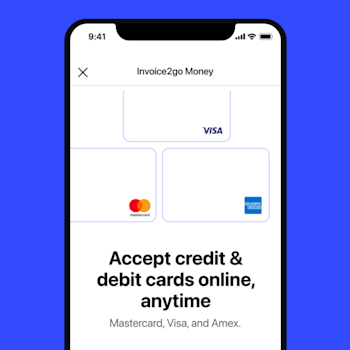
How to accept credit card payments on Invoice2go in 3 simple steps
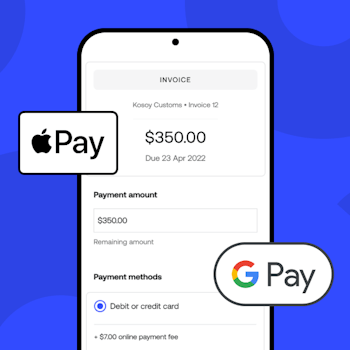
Accept payments online via Apple Pay and Google Pay
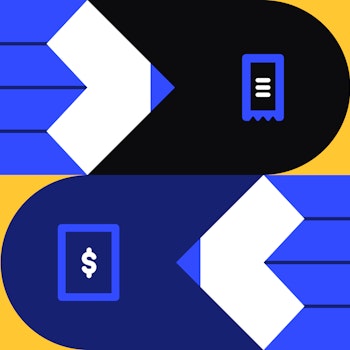
Must-not-miss write-offs as you wrap up 2022 year-end finances
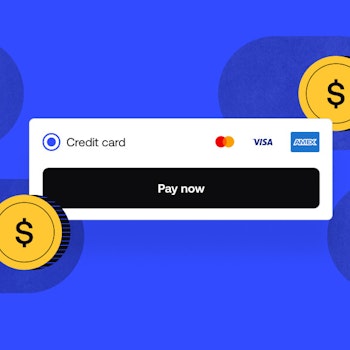
5 ways accepting credit and debit card payments helps your business stay resilient

4 easy ways to increase cash flow today

What is Small Business Saturday and why is it important?
The features and surprising benefits of a well-designed packing slip
